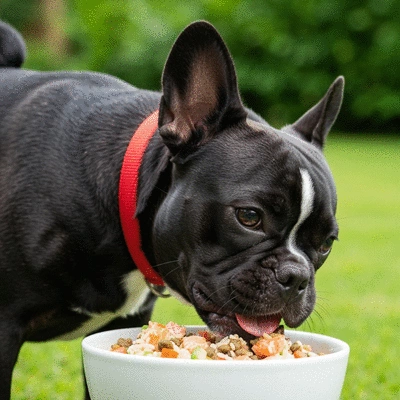Nutrition's Impact on French Bulldogs

Did you know that proper nutrition can significantly enhance your French Bulldog’s ability to learn and focus? By understanding their unique dietary needs, you can transform training sessions into effective and enjoyable experiences for your furry friend.
What You Will Learn
- Understand the specific nutritional needs of your French Bulldog at each life stage, from puppy to senior.
- Incorporate high-quality proteins, healthy fats, and digestible carbohydrates into their diet to support their training potential.
- Prioritize vitamins and minerals that boost immunity and cognitive function, enhancing overall health.
- Address any food allergies or sensitivities to improve behavior and learning ability during training.
- Utilize food as a motivational tool during training sessions to reinforce positive behavior and outcomes.
Key Nutritional Influences on French Bulldog Trainability
Understanding your French Bulldog's dietary needs across life stages and the impact of essential nutrients is crucial for enhancing their focus and learning abilities during training. If you're looking for comprehensive advice on what to feed your Frenchie, check out our French Bulldog Diet Tips for Aussies.
Life Stage Nutritional Needs
- Puppy: Higher calories & nutrients for rapid development.
- Adult: Balanced diet for weight maintenance & energy.
- Senior: Fewer calories, focus on joint health & wellness.
Essential Nutrients for Focus
- Proteins: Tissue repair, crucial for active Frenchies.
- Fats: Energy, skin & coat health (e.g., Omega-3s for brain).
- Carbohydrates: Quick energy source, aids digestion.
Cognitive & Health Boosters
- DHA & Omega-3s: Brain development, cognitive function.
- Antioxidants: Combat cognitive decline, mental sharpness.
- Glucosamine: Supports joint health & mobility for active training.
Optimal Feeding Practices
- Caloric Needs: Tailor to age, size, activity; portion control.
- Timing: Smaller, frequent meals to maintain energy & focus.
- Diet Type: Kibble, wet, or raw – choose balance carefully.
The Impact of Nutrition on French Bulldogs’ Trainability and Focus
As a dedicated French Bulldog enthusiast, I’ve seen firsthand how nutrition plays a vital role in our furry friends’ ability to learn and stay focused during training sessions. It’s not just about filling their bowls; it’s about providing the right balance of nutrients that support their unique needs. In this section, we’ll dive into the essential nutritional requirements of French Bulldogs and how they influence trainability.
Understanding the Nutritional Needs of French Bulldogs
French Bulldogs have specific dietary requirements that vary based on their age and activity levels. Understanding these needs is crucial for optimizing their training potential. Here are some important life stages to consider:
- Puppy: Growing Frenchies need more calories and nutrients to support their rapid development.
- Adult: Once they reach adulthood, their diet should focus on maintaining a healthy weight and supporting energy levels.
- Senior: Older dogs may require fewer calories and a diet that promotes joint health and overall wellness.
Each life stage presents unique challenges and opportunities for enhancing focus and trainability, so adjusting their diet accordingly can make a significant difference.
Life Stage Considerations: Puppy, Adult, and Senior
When considering your French Bulldog's diet, it’s essential to tailor their food to their current life stage. Puppies need nutrient-rich food to support growth, while adults require a balanced diet to maintain their energy levels. As our dogs age, senior nutrition becomes increasingly important, focusing on mobility and overall health.
Essential Nutrients: Proteins, Fats, and Carbohydrates
The foundation of a healthy diet includes proteins, fats, and carbohydrates. For French Bulldogs, these nutrients are vital for:
- Proteins: Building and repairing tissues, which is crucial for active pups.
- Fats: Providing energy and supporting skin and coat health.
- Carbohydrates: Offering a source of quick energy and aiding digestion.
By providing a balanced mix of these nutrients, we can support our Frenchies' training efforts, ensuring they are focused and ready to learn! For detailed guidance on managing their caloric intake to optimize health and training, explore our article on Managing Your French Bulldog's Calories.

The Role of Vitamins and Minerals in Supporting Overall Health
Vitamins and minerals are often overlooked but are incredibly important for maintaining your French Bulldog’s overall health. Essential vitamins like A, D, and E, along with minerals such as calcium and phosphorus, help in:
- Boosting immunity: Keeping them healthy and active.
- Supporting bone health: Especially important for young and senior dogs.
- Improving cognitive function: Helping your Frenchie stay sharp and alert during training.
Incorporating a complete diet filled with these vitamins and minerals will enhance their ability to learn and focus while training.
How Nutrition Influences Cognitive Function and Learning
It's fascinating to see how what we feed our dogs can affect their brains! Nutrition directly impacts cognitive function, which is crucial for learning and trainability. Let’s look at some key nutrients that play a role.
The Role of DHA and Omega-3 Fatty Acids in Brain Development
DHA (Docosahexaenoic Acid) and Omega-3 fatty acids are essential for brain health. These nutrients support brain development and function, leading to improved learning abilities in puppies and cognitive function in older dogs. Including these in your French Bulldog's diet can enhance their trainability!
Antioxidants and Their Impact on Canine Cognitive Function
Antioxidants are powerful allies in the fight against cognitive decline. They help combat oxidative stress, which can impair cognitive function. Including a diet rich in antioxidants can help your French Bulldog stay mentally sharp throughout their life.
Glucosamine and Joint Health: Supporting Overall Mobility
Joint health is also a significant factor in how well your Frenchie can train. Glucosamine is known for supporting joint health and mobility. By ensuring your dog gets enough glucosamine, you can help them stay active and engaged during training.
Feeding Guidelines for Optimal Trainability
Feeding your French Bulldog correctly is essential for their trainability. Here are some guidelines tailored to their specific needs:
Caloric Needs and Portion Control Specific to French Bulldogs
Understanding your French Bulldog’s caloric needs based on their size, age, and activity level is vital. Here’s a simple breakdown:
- Puppies: Higher caloric intake to support growth.
- Adults: Moderate calorie flow to maintain weight.
- Seniors: Less calorie intake, focusing on quality and health.
Portion control is key to preventing obesity, which is a common issue in French Bulldogs.
Feeding Practices to Enhance Focus During Training Sessions
Timing and method of feeding can also impact how well your Frenchie learns. Consider feeding smaller meals throughout the day to maintain energy levels. This can help keep their focus sharp during training sessions.
Creating a Balanced Diet: Kibble vs. Wet Food vs. Raw Diet
Finally, let’s talk about the different types of diets you can provide:
- Kibble: Convenient and often fortified with essential nutrients.
- Wet Food: More palatable and hydrating.
- Raw Diet: Potentially beneficial but requires careful planning and safety precautions.
Finding the right balance for your French Bulldog’s diet will help them stay healthy and focused during training!
Exploring Raw Diets: Benefits and Considerations
Raw diets are becoming increasingly popular among dog owners. However, it’s important to approach this type of feeding with care. Here’s what you should know:
Understanding AAFCO Guidelines and Safety Tips for Raw Feeding
The AAFCO (Association of American Feed Control Officials) provides guidelines that can help you navigate raw feeding. Ensuring proper food handling and quality sourcing is crucial to avoid risks associated with raw diets.
Potential Risks vs. Rewards of Raw Nutrition for French Bulldogs
While raw diets can offer benefits like improved coat health and energy levels, they also come with potential risks. It’s essential to weigh these factors carefully before transitioning your Frenchie to a raw diet.
Homemade Dog Food: Crafting Nutritional Recipes for Your French Bulldog
If you're considering homemade meals, I recommend consulting with a veterinarian or a pet nutritionist to ensure you’re meeting all your French Bulldog’s nutritional needs. Crafting balanced recipes can be a rewarding experience!
Frequently Asked Questions
- Q: How does nutrition impact my French Bulldog's trainability?
- A: Proper nutrition significantly enhances a French Bulldog's ability to learn and focus by providing the necessary energy for cognitive function, supporting brain development with nutrients like DHA, and maintaining overall health, which reduces distractions from discomfort or illness.
- Q: What are the key nutritional needs for French Bulldogs at different life stages?
- A: Puppies require more calories and nutrients for rapid development. Adult French Bulldogs need a balanced diet for weight maintenance and energy. Senior French Bulldogs generally require fewer calories and a diet focused on joint health and overall wellness.
- Q: Which essential nutrients are most important for focus and learning in French Bulldogs?
- A: High-quality proteins are crucial for tissue repair; healthy fats (especially Omega-3s and DHA) support brain development and cognitive function; and digestible carbohydrates provide quick energy. Vitamins and minerals also boost immunity and cognitive health.
- Q: Can food allergies affect my French Bulldog's behavior and ability to learn?
- A: Yes, food allergies and sensitivities can lead to discomfort, itching, and digestive upsets, which can significantly impair your French Bulldog's ability to focus and learn during training sessions. Identifying and managing these allergies is key to improving behavior.
- Q: How can I use food as a motivational tool during training?
- A: Using small, healthy treats as rewards for good behavior during training sessions can powerfully reinforce positive outcomes. Timing nutritional intake, such as feeding smaller, frequent meals, can also help maintain consistent energy and focus.
Addressing Food Allergies and Sensitivities
Finally, it’s crucial to consider food allergies and sensitivities, which can significantly affect your dog’s behavior and learning ability. Here’s how to manage them.
How Allergies Can Affect Behavior and Learning Ability
Food allergies can lead to discomfort, affecting your Frenchie’s ability to focus and learn. If you notice signs of allergies, like itching or digestive upsets, it may be time to revisit their diet.
Identifying Hypoallergenic Diets for French Bulldogs
For French Bulldogs with food sensitivities, hypoallergenic diets can be a game changer. Look for foods that contain novel proteins that your dog hasn’t been exposed to before, such as duck or venison.
Managing Food Sensitivities for Improved Digestive Health
Implementing a simplified diet can help manage food sensitivities. Monitoring their reactions to food and adjusting accordingly ensures your Frenchie’s digestive health is optimized.
Practical Training Tips Linked to Nutrition
Nutrition and training go hand in hand. Here are some practical tips to enhance your training sessions with your French Bulldog:
Using Food as a Motivational Tool in Training
Food can be a fantastic motivator for training! Use small, healthy treats to reward good behavior, reinforcing positive outcomes during sessions.
Timing Nutritional Intake to Enhance Learning Outcomes
Feeding your dog just before training can enhance their focus and energy. Experiment with meal timing to see what works best for your Frenchie!

Incorporating Positive Reinforcement into Training Sessions
Combining nutritious treats with positive reinforcement is an effective way to train your dog. This method not only boosts their learning but also strengthens the bond between you and your furry companion. For more insights on effective training, consider exploring various Training Plans for French Bulldogs.
Interactive Poll: Share Your Thoughts!
How do you feel about the impact of nutrition on your French Bulldog's trainability? Choose one option below:
Summarizing the Connection Between Nutrition and Trainability
As a French Bulldog owner and enthusiast, I've seen firsthand how nutrition plays a crucial role in shaping our pets' trainability. By focusing on their dietary needs, we can significantly enhance their ability to learn and stay engaged during training sessions. It's not just about what we feed them; it's about how we feed them, too!
Let’s take a moment to summarize the key points that connect nutrition with effective training. Providing a balanced diet rich in essential nutrients helps our French Bulldogs not only maintain their physical health but also supports their cognitive functions. If you're looking to boost your Frenchie's focus and performance, these considerations are invaluable.
Key Takeaways for Effective Nutrition Practices
- Understand the specific nutritional needs of your French Bulldog at each life stage.
- Incorporate high-quality proteins, healthy fats, and digestible carbohydrates into their diet.
- Prioritize vitamins and minerals that support overall health and cognitive function.
- Address any food allergies or sensitivities to improve behavior and learning ability.
- Utilize food as a motivational tool during training sessions to reinforce positive behavior.
By keeping these key takeaways in mind, you'll be well on your way to creating a nutrition plan that enhances your Frenchie's trainability. Remember, a well-fed dog is a happy and focused dog!
Encouraging a Holistic Approach to Training and Nutrition
When it comes to raising a happy and healthy French Bulldog, I firmly believe that we must embrace a holistic approach to their care. This means considering not just their diet but also how it interacts with their training and overall well-being. Have you noticed how a well-fed pup is more eager to learn? That's no coincidence!
Combining nutritious meals with positive training practices leads to better outcomes. This interconnectedness fosters an environment where our French Bulldogs feel supported and motivated to learn. Let's ensure we're doing our best for them by creating routines that incorporate both nutrition and training in a cohesive manner.
Taking Action for Your French Bulldog’s Health and Focus
Now that we've established the importance of nutrition, it's time to take actionable steps for your French Bulldog's health and focus. With the right guidance and planning, we can create a framework that promotes not only their trainability but also overall well-being!
Consulting with Veterinarians for Tailored Nutritional Advice
Always remember to consult with your veterinarian for tailored nutritional advice. Each French Bulldog is unique, and a vet can help you craft a diet plan that meets your specific pet's needs. Trust me, this step is essential for ensuring your Frenchie gets the right balance of nutrients!
Creating a Comprehensive Feeding and Training Plan
It's vital to develop a comprehensive feeding and training plan that aligns with the principles we've discussed. This plan should include realistic feeding schedules and training goals that promote effective learning.
Incorporating Exercise Regimens for Enhanced Energy Levels
Don’t forget to incorporate exercise regimens to enhance your French Bulldog's energy levels! Regular physical activity not only keeps them fit but also supports their mental health. A tired dog is often a well-behaved dog, so let’s keep those little legs moving! For more insights into maintaining their health, understanding potential French Bulldog Health Issues is also crucial.
Recap of Key Points
Here is a quick recap of the important points discussed in the article:
- Understand the specific nutritional needs of your French Bulldog at each life stage: puppy, adult, and senior.
- Incorporate high-quality proteins, healthy fats, and digestible carbohydrates to support their growth and energy levels.
- Prioritize essential vitamins and minerals to boost overall health and cognitive function.
- Address any food allergies or sensitivities to improve your dog's behavior and learning ability.
- Use food as a motivational tool during training sessions to encourage positive behavior and engagement.









